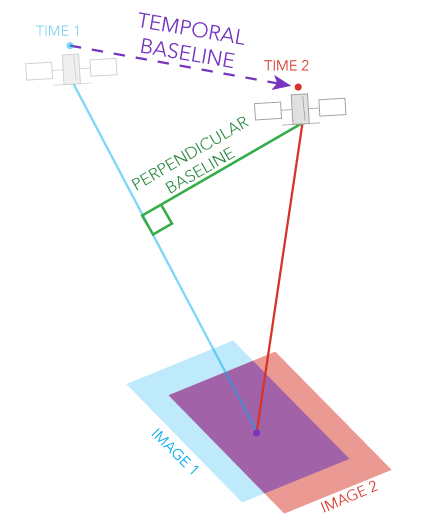| Label | Explanation | Data Type |
Input Reference Radar Data
| The input reference complex radar data. | Raster Dataset; Raster Layer |
Input Secondary Radar Data
| The input secondary complex radar data. | Raster Dataset; Raster Layer |
Output Secondary Radar Data
| The output secondary radar data coregistered to the reference radar data. | Raster Dataset |
DEM Raster
(Optional) | The DEM raster that will be used to estimate the local illuminated area. | Mosaic Layer; Raster Layer |
Apply geoid correction
(Optional) | Specifies whether the vertical reference system of the input DEM will be transformed to ellipsoidal height. Most elevation datasets are referenced to sea level orthometric height, so a correction is required in these cases to convert to ellipsoidal height.
| Boolean |
Polarization Bands
(Optional) | The polarization bands that will be corrected. The first band is selected by default. | String |
Available with Image Analyst license.
Summary
Resamples the secondary single look complex (SLC) data to the reference SLC grid using a digital elevation model (DEM) and orbit state vector metadata.
For Terrain Observation by Progressive Scan (TOPS) mode radar data, the tool also deramps and demodulates the secondary SLC before resampling. Once resampling is performed, the secondary radar data is reramped and remodulated.
Usage
For Sentinel-1 SLC data, use this tool after the Apply Orbit Correction tool.
For InSAR and DInSAR applications, the input radar data must have the same satellite geometry.
To optimize coregistration results, use the highest resolution DEM available for the area of interest.
Use the Compute Coherence tool to measure the success of the coregistration.
Baseline considerations for InSAR applications are shown in the following table:
Baseline type Definition Smaller baseline Larger baseline Perpendicular baseline
The component of the physical separation between the two satellite acquisition positions that is perpendicular to the line of sight (LOS).
Preserves phase coherence, which is ideal for surface deformation monitoring. Sensitivity to elevation differences is reduced, making it less ideal for DEM generation.
Increases sensitivity to topography, which is ideal for DEM generation.
Temporal baseline
The time separation between the two acquisitions.
Better coherence in dynamic areas and captures rapid changes such as landslides and earthquakes.
Suitable for detecting slow, cumulative deformation such as tectonic motion, although it carries a risk of decorrelation.

Parameters
ApplyCoregistration(in_reference_radar_data, in_secondary_radar_data, out_secondary_radar_data, {in_dem_raster}, {geoid}, {polarization_bands})| Name | Explanation | Data Type |
in_reference_radar_data | The input reference complex radar data. | Raster Dataset; Raster Layer |
in_secondary_radar_data | The input secondary complex radar data. | Raster Dataset; Raster Layer |
out_secondary_radar_data | The output secondary radar data coregistered to the reference radar data. | Raster Dataset |
in_dem_raster (Optional) | The DEM raster that will be used to estimate the local illuminated area. | Mosaic Layer; Raster Layer |
geoid (Optional) | Specifies whether the vertical reference system of the input DEM will be transformed to ellipsoidal height. Most elevation datasets are referenced to sea level orthometric height, so a correction is required in these cases to convert to ellipsoidal height.
| Boolean |
polarization_bands [polarization_bands,...] (Optional) | The polarization bands that will be corrected. The first band is selected by default. | String |
Code sample
This example coregisters the secondary radar dataset to the reference radar grid.
import arcpy
arcpy.env.workspace = r"C:\Data\SAR"
outRadar = arcpy.ia.ApplyCoregistration("Reference_SAR.crf",
"SecondarySAR.crf", "dem.tif", "GEOID", "VV")
outRadar.save("Secondary_SAR_Coreg.crf")This example coregisters the secondary radar dataset to the reference radar grid.
# Import system modules and check out ArcGIS Image Analyst extension license
import arcpy
arcpy.CheckOutExtension("ImageAnalyst")
from arcpy.ia import *
# Set local variables
in_reference_radar_data=r"C:\SAR\Reference_SAR.crf"
in_secondary_radar_data=r"C:\SAR\Secondary_SAR.crf"
in_dem_raster=r"C:\DEM\dem.tif"
geoid="GEOID"
polarization_bands ="VV"
# Execute
outRadar = arcpy.ia.ApplyCoregistration(in_reference_radar_data,
in_secondary_radar_data, in_dem_raster, geoid, polarization_bands)
outRadar.save(r"C:\SAR\Secondary_SAR_Coreg.crf")